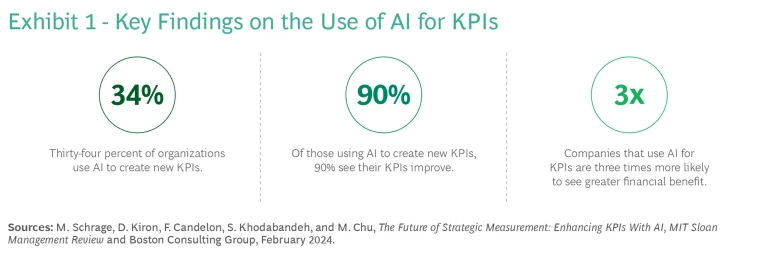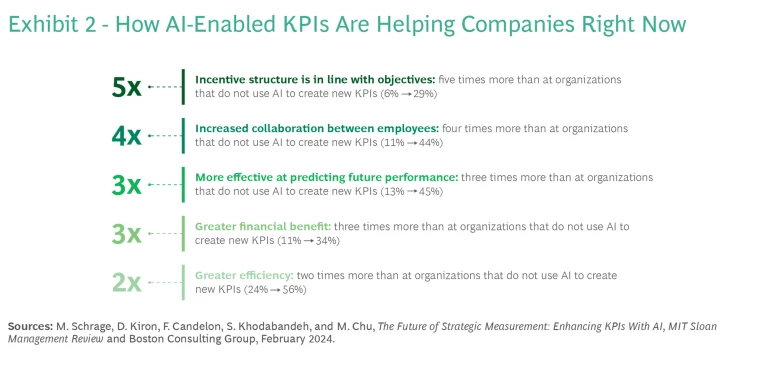Companies that use the same old KPIs to measure success are missing out on opportunities to better align people and processes, prioritize resources—and generate value. By contrast, forward-looking organizations are benefiting from using AI to generate KPIs that are more intelligent, adaptive, accurate, and predictive than legacy performance indicators.
To better understand the power and potential of AI-enabled KPIs, the BCG Henderson Institute, BCG X, and MIT Sloan Management Review conducted a global survey of more than 3,000 managers representing more than 25 industries and 100 countries. We also interviewed 17 top executives from around the world from organizations including General Electric, Maersk, Pernod Ricard, and Wayfair to understand how successful firms are approaching this new paradigm in performance measurement.

The results: leading companies are not just using AI to enhance performance but to redefine it by challenging long-held assumptions about the drivers of business success. (See Exhibit 1.)
These results have far-reaching implications for how companies organize themselves and operate. Identifying strategic and operational KPIs has historically been the job of executive leaders often relying on their gut instincts, experience, and expertise. But human intuition can only go so far in a world of extraordinary data volume and complexity. AI can reveal novel layers of insight by exploring and connecting data in ways beyond the reach of even the savviest of managers.
Our survey results reveal that AI can identify latent or undervalued performance drivers in order to design new KPIs capable of guiding executive decision making. In our interviews, we heard from business leaders about how they are already using AI-powered KPIs to:
- Navigate the tradeoff between profit margins and market share.
- Understand the true and often hidden drivers of demand or customer satisfaction.
- Resolve complex operational or strategic tradeoffs—e.g., speed vs reliability.
These are just a few of the tangible and measurable benefits that companies are already deriving from the use of AI to transform performance measurement.
Because performance drivers interact in complex ways, companies increasingly recognize that the right KPIs aren’t enough; they also need to understand how they relate to one another. AI can reveal the tacit or subtle links between KPIs, providing invaluable insight to leaders seeking to ensure organizational alignment around enterprise goals.

Organizations using AI-enabled KPIs are five times more likely to effectively align incentive structures with objectives compared to those that rely on legacy KPIs. (See Exhibit 2.)
By investing in algorithmically improving their KPIs companies such as Schneider Electric, Pernod Ricard, and Sanofi are not just raising the bar but are reconsidering the very purpose of performance measurement. It makes sense then that all of the executives we interviewed said that improving KPIs with AI is an enterprise interest, and, for several, an immediate priority.
Where KPIs were once the domain of human expertise and decision making, AI has profoundly reshaped their powers and purpose. The result is less a smooth transition than a disruption: the human monopoly on KPI development, management, and governance is eroding.
The question for executives at most companies is: How to get started? Taking steps to realign data governance, establish KPI governance systems, use digital twins to enhance KPIs themselves, and prioritize cultural readiness are key to success.
For more survey findings and analysis, read the report.








